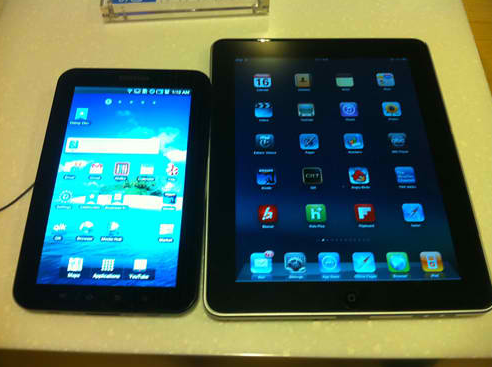
Tablets are all the craze right now, and it's no secret that the iPad has been a great success for Apple. To be honest, I was skeptical of the tablet frenzy at first but I'm quite pleased with mine and rarely leave the house without it. The iPad makes working fun when I can get past the games and actually make it to the email application. The battery life is great and overall, it offers a pleasing experience. I don't expect a tablet to replace my laptop, but the iPad does a decent job on the go.
Everyone was wondering what RIM had up their sleeve with the rumored “BlackPad” until this past Monday. The company announced the PlayBook and from the videos and spec sheets, it should be a true contender to the veteran iPad. The PlayBook offers flash support and multitasking out-of-box, which are two things that are yet to be introduced to the iPad (though multitasking is on the way). RIM's PlayBook comes with a completely new OS on it and has actually wowed me. I've always been a huge fan of RIM, but I was uninterested in all of their tablet rumors until Monday evening.
With two competitors already in existence, Android tablet manufacturers have a mountain to climb. There are some cheap Android tablets that can be found in various places on the Internet, but nothing outside of the Samsung Galaxy Tab holds a candle to the iPad or the PlayBook at the moment. This is where the Android tablet could definitely flop. Like I've said previously, Android is great but it has two major flaws, application quality and battery. Stretching the screen size even more could make the applications on an Android tablet very unpleasing. I had an Archos tablet for about a week a few months back and even on a 5” screen, the applications looked very grainy and washed out (due partially to the low-quality screen). Android developers are going to have to step it up in the graphics department if they want Android to survive in the tablet world. One thing people expect out of a tablet is a media-rich experience. With low-quality graphics in a lot of applications, it leaves a lot of room for improvement. Not only are the applications going to have to be improved, but the hardware will have to be top-notch. Cheap hardware will make for affordable tablets, but the quality of them will be so poor, they won't be worth buying. Hopefully Samsung will set the standard for Android tablet hardware.
My greatest doubt with Android tablets centers around battery life. The Samsung Galaxy Tab claims it can do over seven hours of video playback, which is impressive, but that is only one manufacturer. Until I get one in my hands and drain the battery myself, I will remain doubtful. Without having a battery that can last me through the day, a tablet would be useless to me. I have yet to have my iPad die on me, and I use it pretty heavily throughout the day. When I don't use it everyday, it can make it through the week on one charge. Last week I took my iPad off if its charger on Monday morning and didn't charge it until Friday night. I used it on and off all week, but it never died. I hope to see comparable battery life from Android tablets.
What will undoubtedly set Android tablets apart from their counterparts is a choice when buying and customization. A 9.7” tablet isn't for everyone. The iPad comes in two different models (Wi-Fi only or Wi-Fi with 3G) with varying memory capacities (16GB, 32GB, and 64GB). Likewise, the PlayBook will be offered in a few different variations (Wi-Fi and 3G/4G) with different capacities, 16GB and 32GB. Android tablets, on the other hand are going to be made by countless manufacturers, meaning they will come in different form factors, different sizes, different capacities, and possibly with different hardware features like USB ports and expandable memory (one can dream).
In addition to manufacturer choice, Android tablets will come with customized user interfaces. On top of that, you should still have home replacement options in Android Market like Launcher Pro, ADW Launcher, and other various apps that you can theme. Meaning, Android tablets will be the only ones that offer true customization. My iPad is fun and all, but all I can do to customize it is change the wallpaper and move some icons around. The PlayBook is still a bit of mystery, but it looks like it has a very intuitive user interface. It almost looks like a webOS-BlackBerry 6 hybrid with its card-like multitasking and app drawer. That said, I'm guessing the Android tablets will still have the most interactive interfaces with widgets and separate homepages.
There is ample opportunity for Android tablets to storm the market and hold their own. Let's just hope the manufacturers bring serious hardware to the table, and developers bring higher-quality applications to the Market to help compete with the other heavy-hittin' tablets.